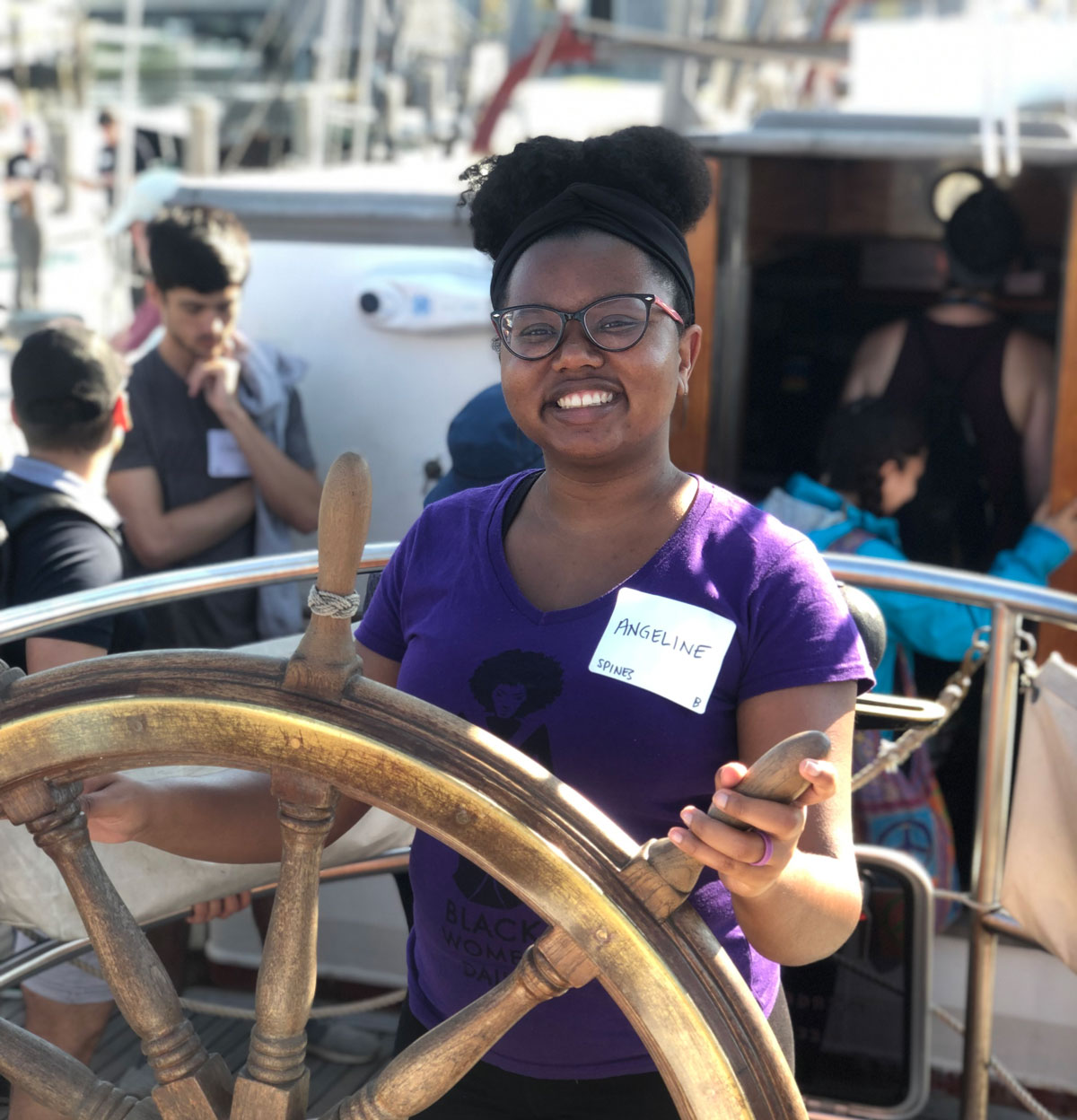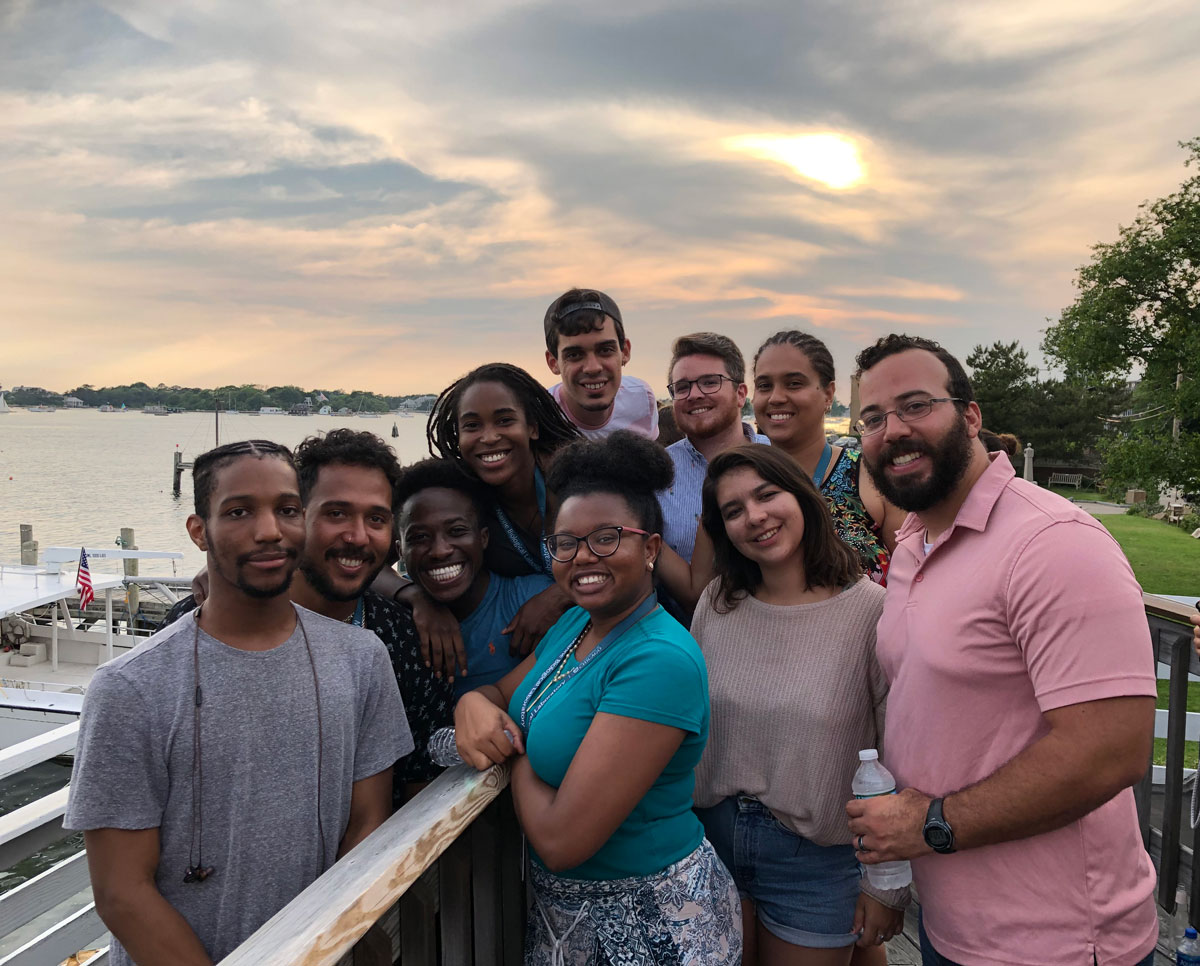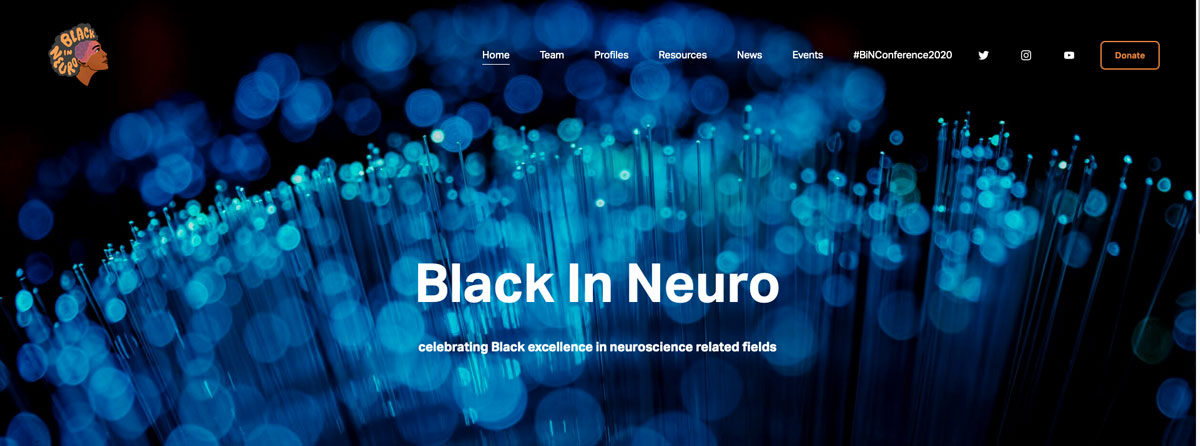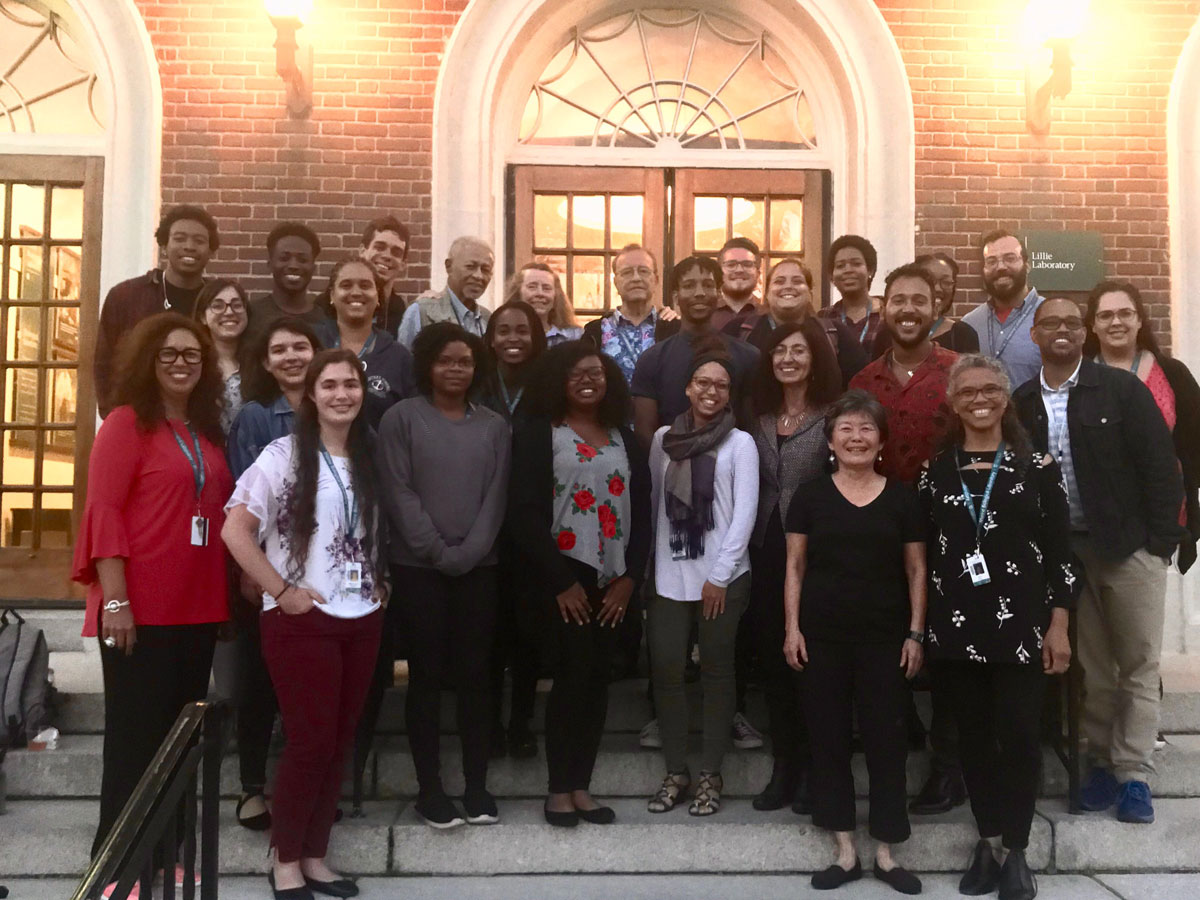The Sky's the Limit for Black In Neuro

Note: The MBL Summer Program in Neuroscience, Excellence and Success (SPINES) is accepting applications for 2021! The course is scheduled for July 3-25 and the application deadline is March 26.
 Angeline Dukes
Angeline DukesAngeline Dukes (MBL SPINES ‘19) is president and founder of Black In Neuro, a community of neuroscientists, neuro-engineers and science communicators that sprang up and took off with huge momentum last July. What started with a simple Tweet from Dukes is now a fast-growing organization with a board and organizing team of 21 collaborators, 25K social media followers, and sponsorships from major organizations.
#BlackInNeuroWeek, the group's first event, drew 2,000 registrants for daily, themed discussions on social media. Designed to celebrate and amplify Black voices in STEM, the topics included personal journeys, racism, mentorship, women, art, and joy in neuroscience. The group has since held other virtual events (recordings are here) and amassed significant resources for outreach and professional development, including an online database of more than 500 profiles of Black scholars in neuroscience, many of whom are available for speaking engagements or mentorship.
Dukes is a fourth-year PhD candidate in the Christie Fowler lab at the University of California-Irvine. For her doctoral research, she is studying how adolescent exposure to nicotine and cannabinoids may affect long-term behaviors, using a mouse model. In the edited interview below, she shares her thoughts on her journey to Black in Neuro.
When did you decide you wanted to be a neuroscientist?
My parents are immigrants; my mom is from Trinidad and my dad is from Haiti. I'm a first-generation American and a first-generation college graduate. Growing up I was taught, you either become a doctor or a lawyer to make your parents proud. I did not have an interest in law; so I decided I wanted to be a pediatrician, because I really love kids. I was on that track [of pre-medicine] up until the summer before my junior year in college, when I realized I didn't really like it. I was doing it because I was told I had to, as opposed to something I was really passionate about. But I was getting a degree in biology and didn't really know what other options I had. Thankfully, I went to an HBCU (Historically Black College or University), Fisk University in Nashville, Tenn. I had wonderful Black female professors, and it was because of them that I learned that going to graduate school was an option.
The reason I decided to go to graduate school was I realized I really love teaching. My long-term career goal is to be a neuroscience professor, hopefully at an HBCU. They have a very close place to my heart. I’d like to get more Black students to realize, “Hey, this is an option for you, too, you can teach and do research and you can thrive in this field.”
How did attending SPINES impact your career or life?
I had not met a lot of Black or underrepresented neuroscientists before attending SPINES. So one of the biggest benefits for me was just meeting other underrepresented graduate students and postdocs, but also faculty. Seeing them be successful, hearing them talk about the highs and lows of their journeys, was incredibly motivating. It also impacted the way that I give presentations. Most of the faculty shared their personal journeys before telling us about their research or giving professional development [advice]. I think a lot of people resonate with that. So I try to talk about my journey, too, especially when I'm presenting to undergrads. It’s a reminder that nothing is straightforward and perfect. We all have our struggles but we can persevere.
 Taking in a Woods Hole evening during SPINES 2019 (L-R): (first row) Omar Koita, Michael Rosario, Sena Agezo, Angeline Dukes, Audrey Weber, and Zachary Jones; (top) Nahdia Jones, Adbiel Rodriguez, Alejandro Lopez, and Ismary Blanco. Photo courtesy of Angeline Dukes.
Taking in a Woods Hole evening during SPINES 2019 (L-R): (first row) Omar Koita, Michael Rosario, Sena Agezo, Angeline Dukes, Audrey Weber, and Zachary Jones; (top) Nahdia Jones, Adbiel Rodriguez, Alejandro Lopez, and Ismary Blanco. Photo courtesy of Angeline Dukes.Another important thing I learned during SPINES is how to ensure proper representation of underrepresented minorities (URM) and women speakers. During SPINES, I had the pleasure of introducing Dr. Anne Etgen as one of our speakers. She gave two talks: one on grant writing, which was incredibly helpful for me, and one on unconscious/implicit bias, which I knew would be helpful for other people in my department (at UC Irvine). She emphasized that we can encourage organizers of speaker seminar series to include diverse speakers. So a few months after SPINES, I requested that my department invite Dr. Etgen to give a talk on biases, the importance of diversity, and how non-URM people can enact change. It was very well received! She and I still stay in contact to this day.
Did SPINES have anything to do with the formation of Black in Neuro?
The SPINES community helped a lot with starting to develop these relationships. When I was meeting all these people at SPINES they were like, “Oh, yeah, you can follow me on Twitter!” and I realized, “Well, I don't have one!” So I actually made a Twitter one evening and the first people I followed were from SPINES, like Dr. Gina Poe. That was really nice to start developing those connections. Then, Black in Neuro started because of a Tweet I sent the next summer saying, “When are we doing a #BlackInNeuro week?” Quite a few people commented saying, “We’d love to help,” and two days later we had our first planning meeting. Three weeks after that, #BlackInNeuroWeek was live! It was a very, very quick turnaround and just worked out so well. The team is fantastic; every single person is heavily dedicated to its continual success. The majority of us are graduate students and post-docs. That’s really nice because we know what we need and are hosting events to help ourselves as well as other Black In Neuro community members. While we, of course, have members of the Black community on our organizing team, we also have non-Black members. I think it’s helpful to have their perspectives and insight. But I want to emphasize that the non-Black organizers make it a point to center Black voices; they make sure that our needs are heard. And that whatever actions are being taken are really centered around the Black community. This is a really important lesson in allyship.

What do you think are some of the most important conversations happening on @BlackInNeuro and through the organization?
A lot of the conversations we’re having focus on community, mentorship, and racism in neuroscience. Community is incredibly important because a lot of [URMs] don't necessarily feel supported at their institutions. Being able to feel like you belong somewhere has a huge impact on whether or not you choose to stay there. So programs like SPINES or Black In Neuro help build those types of communities and show that, even if you are the only Black person in your department, there are plenty of us around the world who you can talk to, who can support you and understand some of what you're going through, as part of our shared experiences as Black people. We've been talking a lot about mentorship, too, because we hope to develop a formalized mentoring program. If you're like me and don't have any Black faculty in your department, it gets hard to find someone to talk to when race-related issues do arise or you need some direction. Because it is a different experience. I'm grateful that my [PhD advisor] is a woman so I can talk to her about sexism in neuroscience, but she can't relate as much to racism in the field. So having a mentor who can understand those different dynamics is really important. We want to develop that type of mentorship so [trainees] feel seen, feel like they have a community, that their voices will be heard and they have someone to talk to. And of course we are talking about racism, which is prevalent in academia in general. Just being able to start having those discussions and knowing that it's not all in your head, and that these experiences you are going through, a lot of people are going through them. The pervasive prevalence of these same problems is sad but it brings these issues to the forefront, and they won't keep being swept under the rug. Through Black In Neuro, we have a lot of allyship, especially from non-Black principal investigators and administrators who want to make structural changes in their departments and academia as a whole. It is really, really nice because it’s the allies, as the majority in the field, who can help keep those conversations going.
Where would you like to see Black In Neuro go?
Right now we're working on becoming a nonprofit. We want to make sure that we're able to still receive donations and pay our speakers. Black In Neuro has had lots of sponsorship, which I'm very proud of and excited about, because we plan to continue free hosting events for Black scholars. At these events, we have had a breadth of speakers from undergraduate students to faculty. We make it a point to pay all of them and hope others follow suit, especially if it’s on DEI (Diversity, Equity, and Inclusion) topics because you are asking for their time and energy. It's mentally taxing to have to relive these experiences and talk about them. We deserve compensation for it. Finally, I really just want this huge community to keep growing, so if a Black student is interested in neuroscience, someone can direct them to Black In Neuro and show there's a whole community with a ton of resources. Whenever the world opens back up, we hope to give travel awards to undergraduates and community college students so they can attend conferences. We know not everyone has access and the resources to do that, but it's a huge factor to be able to network and become competitive for graduate programs. We are toying with the idea of having chapters at different schools, so people can connect at the regional level. And we’ve had lots of interest from different countries so hopefully we’ll be doing things [internationally], too. It's been amazing, but I think this is something people really want. As a Black neuroscientist, it's something we need to have, that sense of community and belongingness. So I feel like the sky’s the limit for Black In Neuro!
 Participants in the 2019 MBL SPINES course after the annual Martinez-Townsel lecture. The co-founders of SPINES, the late James Townsel and Joe Martinez, Jr., are in the back row, 4th and 6th from left, respectively. Photo courtesy of Angeline Dukes
Participants in the 2019 MBL SPINES course after the annual Martinez-Townsel lecture. The co-founders of SPINES, the late James Townsel and Joe Martinez, Jr., are in the back row, 4th and 6th from left, respectively. Photo courtesy of Angeline DukesInterview by Diana Kenney